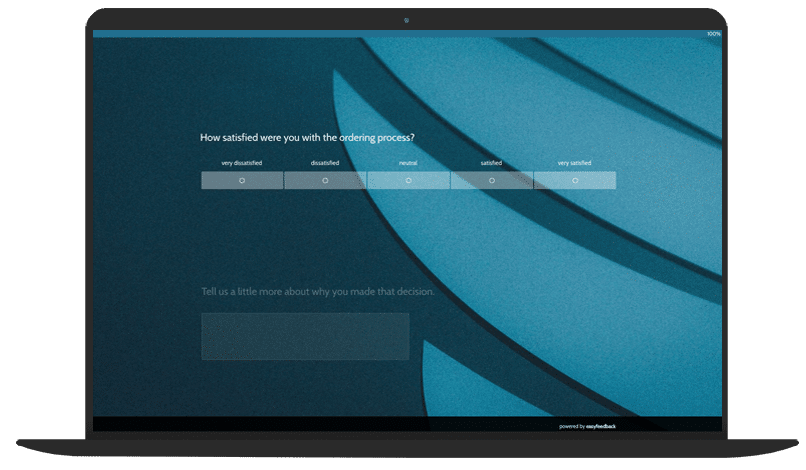What is the Customer Satisfaction Score (CSAT)?
In addition to the Net Promoter Score (NPS) or the Customer Effort Score (CES), the Customer Satisfaction Score is another key figure that helps you to easily survey customer satisfaction in a specific area of your company or with your products or services at regular intervals.
Using a standardized scale from 1 (very dissatisfied) to 5 (very satisfied), your customers can give their feedback and satisfaction on, for example, your ordering process, your website, delivery time, customer service and more.

If, for example, the CSAT survey shows that your customers are very satisfied with the ordering process because it is fast and uncomplicated, then that’s great.
If, on the other hand, your customers say that complaints are tedious and time-consuming, then you should adjust this process. So it makes sense to focus your resources on improving the complaint process.
The CSAT supports you in directing your resources in a targeted manner and thus saving money and time by not putting your resources (more) into areas that are already running well.
In the long run, it does not make your customers more satisfied if processes that are already running well are adjusted, but the improvement of processes that have been running less well so far increases the satisfaction of your customers immensely.
What is the difference between the CSAT and the NPS?
The difference between the NPS and the CSAT is that the Net Promoter Score asks about customer satisfaction and customer loyalty in terms of willingness to recommend using a scale of 0 (unlikely) – 10 (likely), and the CSAT explores customer satisfaction based on a specific interaction, such as the delivery time or the helpfulness of the service staff using a scale of 1 (very dissatisfied) – 5 (very satisfied).
This also results in differences in the calculation of customer satisfaction of the respective methodologies.
What is the difference between the CSAT and the CES?
As mentioned earlier, while the CSAT asks about customer satisfaction based on a specific interaction, such as the ordering process or the information content of the website via a scale, the Customer Effort Score provides information about customer satisfaction in terms of the effort the customer had with an interaction with your company/product via a scale of 1 (extremely easy) – 7 (extremely difficult).
Building on the Customer Effort Score (also called the Customer Effort Index), actions can be taken to optimize and reduce complexity to improve the user experience and customer satisfaction.
What is the difference between the CSAT and Things Gone Wrong (TGW)?
Things Gone Wrong (TGW) is about determining the percentage of customer interactions where something went wrong.
So, for example, the proportion of complaints to the total number of orders or the proportion of buyers who contacted support but did not reach anyone.
TGW is usually expressed as x in 1,000 or x in 1 million.
How is the Customer Satisfaction Score calculated?
The CSAT is calculated very simply.
As already mentioned, your customers can use a scale from 1 (very dissatisfied) to 5 (very satisfied) to provide their feedback and satisfaction, for example, regarding the handling of complaints or the ordering process.

Then you can calculate the CSAT score using the following formula:
(Number of all satisfied (4) and very satisfied (5) reviews / Number of all reviews) * 100 = Customer Satisfaction (%).
Tip: The more respondents to the CSAT survey, the more meaningful the metric.
What is a good CSAT score?
A good CSAT score is approximately 80% customer satisfaction.
Anything between 80 and 50 % should already be paid attention to.
Values below 50 % indicate that a concrete plan must be drawn up to optimize customer satisfaction for the area surveyed.
When can I use the CSAT as a satisfaction survey?
The good thing is that you can use the CSAT survey at any interaction point along your customer journey.
It is flexible and can be used as often as you need.
The important thing to remember is that only one aspect is asked per satisfaction survey.
There should be no mixing of different areas in a CSAT survey. On the one hand, this distracts from the optimization of a specific touchpoint, and on the other hand, the result of the survey would be distorted.
For inspiration on how you can use CSAT surveys in your business, we have listed some possible use cases below.
Simply survey your customers about their satisfaction in the following areas:
- Ordering process
- Web site
- customer service
- Complaint handling
- Use of a product
- Use of a new function/service
- Visit to the store
and much more …

What are the advantages and disadvantages of the CSAT?
Due to its short and simple survey, the CSAT has the advantage that it can be used flexibly and usually has a high response rate.
Its calculation is also simple and provides information on how companies have met customers’ expectations in certain areas or whether there is still a need for optimization.
The disadvantage, however, is that the CSAT survey is a momentary and subjective mood survey and does not provide any information about how the company/brand is perceived overall.
Also, for a meaningful result of customer satisfaction via the CSAT, many participants must be present.
Conclusion: Measuring customer satisfaction with the CSAT
If you want to measure the satisfaction of your customers, the Customer Satisfaction Score is another proven method for measuring and interpreting customer satisfaction with a specific area of your company and your products or services at regular intervals in a simple and flexible way.
The Customer Effort Score allows you to get an impression of how your company meets the expectations of your customers in certain areas or whether there is a need for optimization.
In addition, the metric helps you to target your resources and thus save money and time by not putting your resources (more) into areas that are already running well.
Because as mentioned earlier, it doesn’t make your customers more satisfied in the long run if processes that are already running well are adjusted, but improving processes that have been running less well increases your customers’ satisfaction immensely.
Important: Don't think of the CSAT as just another way to measure customer satisfaction, but how to interpret and analyze satisfaction in a different way in addition to other metrics. Combining the different indicators like NPS, CES, or Things Gone Wrong to determine customer satisfaction is the key to success.
More about Customer Experience
- Everything you need to know about Customer Experience (CX)!
- Creating positive customer experiences with customer experience management
- 3 touchpoints in the customer experience (with video)
- Your way to an effective customer experience strategy!
- 10 methods to analyze the customer experience
- 12 practical examples for improving the customer experience
- 10 metrics to measure Customer Experience
- Customer Effort Score (CES): How much effort do your customers have?
- Everything you need to know about the Net Promoter Score (NPS)!
- Churn Rate: Key metric for measuring customer loyalty
- The Customer Satisfaction Index (CSI): A key to measuring customer satisfaction




